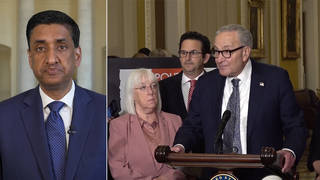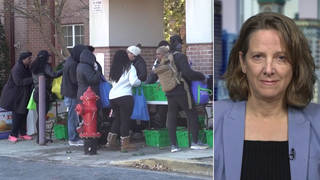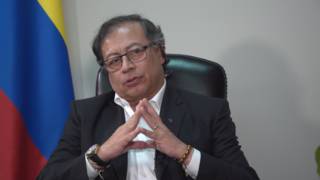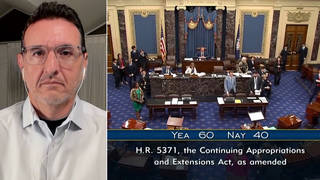
Guests
- Juan Gonzálezaward-winning journalist, Democracy Now! co-host and New York Daily News columnist. His updated edition of his book, Harvest of Empire: A History of Latinos in America, will be released May 31.
Links
- “Harvest of Empire: A History of Latinos in America.” By Juan Gonzalez (Updated Edition, Penguin, 2011)
- Hear Juan Gonzales talk about the first edition of “Harvest of Empire” on Democracy Now! in 2000 (Part 1 of 2):
- Hear Juan Gonzales talk about the first edition of “Harvest of Empire” on Democracy Now! in 2000 (Part 2 of 2):
President Obama’s trip to Puerto Rico was announced at a time when he is making a concerted push to win the Latino vote in 2012. Earlier this month, Obama gave a major address to a mostly Latino audience in El Paso, Texas, calling for immigration reform. Juan Gonzalez joins us to discuss the history of Latinos in the United States and how it relates to U.S. political and military intervention in Latin America. Gonzalez, a Democracy Now! co-host and New York Daily News columnist, has just published an updated edition of his book, Harvest of Empire: A History of Latinos in America. Originally released in 2000, the book explores the stories of Latinos from Mexico, Cuba, Puerto Rico, the Dominican Republic, Nicaragua and around the region. We air a few clips from a new documentary in production based on Harvest of Empire. [includes rush transcript]
Transcript
AMY GOODMAN: Juan, your book, Harvest of Empire: A History of Latinos in America, came out in 2000. So, it’s 2011. You have completely revised it. Why put it out again?
JUAN GONZALEZ: Well, first of all, it has continued to be adopted by many colleges across the country in college courses, and my publisher felt that a lot of the data had sort of gotten outdated in terms of some of the studies that I had been citing. But I also think that the main reason is that the Latino presence in America continues to grow at an astounding level, and most Americans still feel remarkably insecure and lack knowledge as to why this is happening. And you can see it by all the right-wing shows that are constantly stoking anti-immigrant fervor against undocumented immigrants in the country.
And I think — I felt that it was necessary not only to update the figures, but to re-emphasize the enormous transformation that is occurring in the United States, that, for instance, the Census Bureau now projects that before 2050 one out of every three people living in the United States will be of Latino origin. And if the current trends continue, it is entirely possible that by the end of this century, by 2100, half of the entire population of the United States will trace its origins not to Europe, but to Latin America. This is an enormous transformation, when you consider that there were only a few million Latinos in the 1970s, representing about four percent of the population, and now you’re talking about, by 2100, more than 50 percent of the entire nation.
And of course, this is not just happening in the United States. The reality is that there’s been an enormous transformation of the advanced countries of the world since World War II as the third world has come to the West. England doesn’t know what to do about all the Indians, the Pakistanis and the Jamaicans. France doesn’t know what to do about all the Algerians, Tunisians and Moroccans. Germany doesn’t know what to do about all the Turks. The peoples of the colonial countries have come to the West since World War II, and they are transforming the very compositions of these nations, raising all kinds of questions about language and religion and culture. And in the United States, it’s largely been the Latin Americans. As I show, between 1960 and 2008, more than 44 million people migrated to the United States, whether legally or illegally, and half of them were from Latin America, so that really the thrust of the immigration situation in the United States and the growth area is among the Latinos of the southern half of the hemisphere.
AMY GOODMAN: Juan, a documentary about Harvest of Empire is in the works right now. It won’t be completed for a number of months. But I wanted to play a few of the rough cuts from the film. This is the indigenous Guatemalan activist Rigoberta Menchú, who won the Nobel Peace Prize in 1992 for helping to publicize the plight of Guatemala’s indigenous people under the brutal U.S.-backed government.
RIGOBERTA MENCHÚ: [translated] Guatemala was unbelievable. Two hundred thousand dead that we have accounted for, 50,000 disappeared. Eighty-three percent of the disappeared and executed were Mayas. I left Guatemala after they burned my father alive in the embassy of Spain. They were asking for political asylum from the Spanish government. They were trying to save their lives by entering the embassy. But at that moment the Guatemalan security forces attacked the embassy. They burned everyone alive. No one survived — not the students, no one who was there. Is it possible that we can be safe from genocide? Can it be that we will not be victims of genocide tomorrow? I do not have any guarantees. If what exists in Guatemala is persecution, murder, killing, if what you have is insecurity, then I prefer to cross the border and go to a place with more security.
AMY GOODMAN: That was Rigoberta Menchu, the Nobel Peace Prize winner, from the forthcoming documentary, Harvest of Empire. Father Roy Bourgeois is also interviewed in the documentary, who is the founder of the group School of the Americas Watch, speaking about El Salvador in the 1980s.
FATHER ROY BOURGEOIS: I had never seen anything like El Salvador. I was more frightened there than Vietnam. I mean, I had never seen such brutality of a military toward their people. The death squads were running wild. What was going on there was the slaughter of the innocents. It was genocide.
JUAN GONZALEZ: It was a war that was fought everywhere.
FATHER ROY BOURGEOIS: Anyone against U.S. foreign policy or talking about land reform, they were labeled subversive, el enemigo, the enemy.
AMY GOODMAN: That was Father Roy Bourgeois. This is a film that’s being made based on Harvest of Empire, just a very rough cut. How this fits into immigration, Juan?
JUAN GONZALEZ: Well, I think the central theme of my book is that the — you cannot understand the enormous Latino presence in the United States unless you understand America’s role in Latin America, and in fact that the Latino presence in the country is the harvest of the empire. It is the result of more than a century of domination of many of these countries. And in fact, those countries that were most dominated by the United States are the ones that have sent the most migrants to this country. And Cuba, Puerto Rico, the Dominican Republic, Mexico, Salvador, Guatemala, these are the countries that have provided the bulk of the migration from Latin America, largely many of them fleeing from the civil wars, as in the cases of Guatemala and Nicaragua and El Salvador, in which the United States government played a key role in backing one side or the other, others coming here as a result of the needs of American businesses that established migration and recruiting, actually recruited people to come here to fill jobs — that’s more so in the case of the Puerto Ricans and the Mexicans. And so, in essence, the migration flows, the mass migration flows of Latin Americans to this country were a direct response to the needs of the empire. Most Americans are not aware of that, because most Americans don’t even think of our country as an empire.
But I think that what I’ve tried to do in the book is chart how each of the different Latino groups came, what was happening in their country that forced them to leave, how did — what cities did they first arrive in, how did they establish their communities, what kind of hostility or welcome did they meet when they arrived in these various cities around the country, and basically tried to sort of like paint a picture, the human picture, of how it was that this country is now facing this enormous explosion of Latino population.
AMY GOODMAN: We played the clip of Rigoberta Menchú and the images of the burning of the Spanish embassy in 1980. Explain its significance and how it fits into this larger picture.
JUAN GONZALEZ: Well, I mean, as we have said often on Democracy Now!, the United States played a key role in all of the political events that happened in Guatemala going back to 1954, when the CIA, through Operation Success, basically organized the overthrow of a democratically elected government, the Arbenz government, and that led to a civil war that lasted —- the worst civil war in Latin America’s history. And in the process, some people at one point tried to occupy the Spanish embassy. And the Guatemalan, the right-wing Guatemalan government attacked the embassy, burned it down, and killed many of the people inside, including relatives of Rigoberta Menchú. And -—
AMY GOODMAN: Her father was killed.
JUAN GONZALEZ: Yes, her father was killed there. And so, you had this enormous ferment, a lot of it in response to U.S. government policies. In fact, it’s only recently that the new popular government of Guatemala has actually apologized to the Arbenz family and agreed to pay compensation to the family. And it was only a few years ago that President Clinton himself finally acknowledged the genocide that had occurred in Guatemala of the Mayans. So that you have this long history that most Americans are not aware of. But when you ask, “Well, why are all those Guatemalans working in chicken plants in North Carolina or in other parts of the country?” or, “Why is there such a huge Guatemalan population in Houston, Texas?” it really was the people fleeing those civil wars that basically established those communities and sought refuge in the United States from the very policies that the United States government was behind. And so, you know, I try to sort of chart that in the book and show how now basically, though you have these migrants who are here in the United States, are really the main sustenance, economic sustenance, of many of their countries through the remittances they send each month or each week back to maintain members of their families back home.
AMY GOODMAN: The significance of the protests of this month, May, several years ago here in the United States, the largest ever?
JUAN GONZALEZ: Right. Well, as I’ve said repeatedly, I believe they are the largest series of mass protests in the history of the United States. Between March and May of 2006, between three and five million people poured out into the streets of 160 cities across the country, demanding sort of an end to the demonization of immigrants, of undocumented immigrants, and some sort of path to citizenship or legality in the country. And it was subsequent to that that massive crackdowns occurred in the Bush administration — factory raids, mass deportations. And they have continued under the Obama administration, massive deportations of Latin Americans — very similar, I have to point out, as I do in the book, to mass deportations that occurred in the ’50s against Mexicans, Operation Wetback, to mass deportations that occurred in the ’30s under President Hoover, when more than a million Mexicans were rounded up, put on trains, and shipped back to Mexico — so that this is really the latest of a series of anti-immigrant raids or mass deportation programs that have occurred throughout U.S. history.
AMY GOODMAN: Deportations have escalated under President Obama.
JUAN GONZALEZ: Yes, they’ve increased under President Obama. Now, there’s not as many factory raids under President Obama, workplace raids, as there were under President Bush, but many more community raids of individual communities, in search of supposed felon immigrants, but really rounding up all kinds of people and getting them removed from the country.
AMY GOODMAN: The most important overlooked contributions of Latinos in this country, Juan?
JUAN GONZALEZ: Well, I think that the — I attempt to document the enormous contributions that people are not aware of, the early contributions, because Latinos are not only some of the newest immigrants, they’re some of the oldest residents of the country, if you go to South Texas or northern New Mexico, southern Colorado, where Mexicans go back long before those territories became part of the United States. You’ll remember, the entire Southwest was originally Mexican territory and provided enormous wealth to the country. The gold and silver mining industry of California and Nevada, the sheepherding industry of New Mexico, the copper industry of Arizona, and the entire cattle industry of the United States had its origins in Texas, in South Texas. These were all Mexican territories. Much of the labor was Mexican labor that produced these industries. So there’s an enormous contribution to the wealth and prosperity that can be traced back to Latinos of the United States.
AMY GOODMAN: Well, Juan, I’m glad you’re with us tomorrow co-hosting, because…part two. Juan Gonzalez’s book, Harvest of Empire: A History of Latinos in America, extremely fascinating look at the history of this country.












Media Options